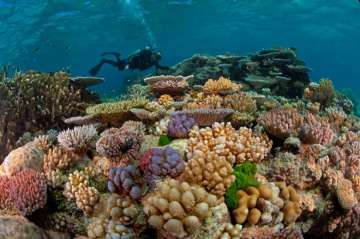The last summer’s record of hot temperature around The Great Barrier Reef, led much of corals getting bleached. Corals were being overcooked, diseased and dying off. This level was not expected until 2050s. The latest study claims that the regular occurrence of damage will be seen. Unfortunately, the most optimistic scenario too predicts of hot temperature. According to the study, there is 87 per cent chance that the Great Barrier Reef will hit these temperatures every year. Even if all the countries stick to the Paris agreement arrangement of keeping global temperatures from rising more than 1.5 degrees above preindustrial levels, there will be a constant and regular damage.
Andrew King, one of the authors of the study said, "At two degrees Celsius of warming, last year's event would actually be a bit cooler than average. This poses a major problem for the survival of most of the Great Barrier Reef."
the great barrier reef
Speaking to the Atlantic, Ruth Gates, a coral biologist at the University of Hawaii and the president of the International Society for Reef Studies said: "By the time we're seeing bleaching temperatures there every year, there probably will not be a reef anymore. There's only five or six times bleaching can happen before a reef is essentially dead." He further said, "You will lose a portion of the reef each time, and there comes a point where it's no longer functionally a reef."
The Great Barrier Reef is listed as World Heritage Site. It is also the world's most sought-after tourist destinations. It's estimated to inject $5 billion (£2.87 billion) into the Australian economy every year. According to the study it's compromised over 3,000 individual reef systems and hundreds of tropical islands.
